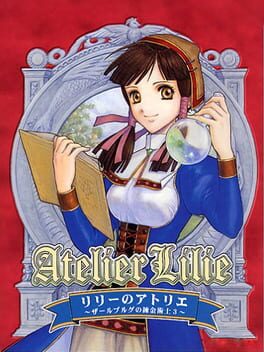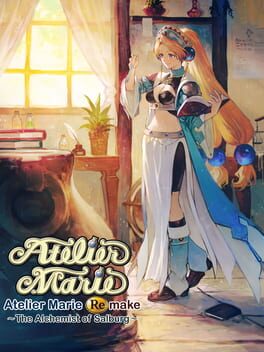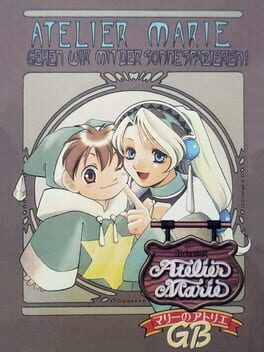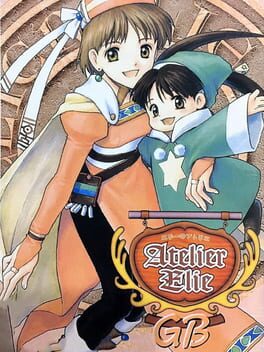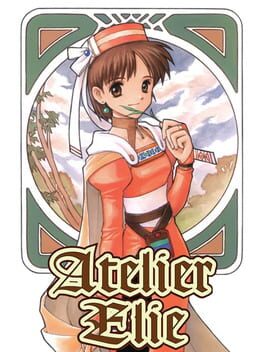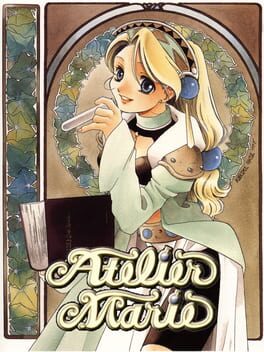

The third game in the Atelier series and last in the Salburg trilogy. The game is a prequel to the previous Salburg games and takes place 20 years before Atelier Marie. The game was only released in Japan.
Also in series
Reviews View More
So ends my journey not only of playing through the Salburg Atelier games but also all five of the main series of Atelier games that never were released in English. I may've done it in a weird order (4, 5, 1, 2, 3), but it offered a very cool perspective on just how the series had changed and when. This is the final adventure in the main series in Salburg, and it had some big shoes to fill after how good Atelier Elie was, and it overall did a pretty darn solid job of filling them! This is yet another game that actually doesn't record in-game time in any way, so I just gotta reckon that it took me some 40 odd hours of playtime over the course of a week to beat the Japanese version of the game with the best ending on the original hardware (using guides online a lot to know what to do and when ^^;).
Despite what the title implies, this is actually a prequel to the other two Atelier games in the Salburg series. It follows the titular character Lilie, an alchemist who has just come with her mentor Dorunie and their two students Helmina and Ingrid to try and establish an alchemy academy in Salburg (the very same academy that Marie and Elie would go on to attend). There are a colorful cast of characters you can recruit in your party, from Karin the tomboyish blacksmith to Gerhard the weapons dealer, and oodles of quests and events involving them you can engage with for more story and goodies.
This character writing especially is definitely where this game shines above its predecessors. In prior Atelier games, side quests and more miscellaneous events usually involved just that character and the titular alchemist or perhaps one or two other characters with whom that character was a sort of dedicated pair with (like how your fellow alchemy students would almost always have events relating to one another in Atelier Elie). in Atelier Lilie, the city feels much more alive in how the characters all seem to know each other and interact with each other from time to time in event to event. It takes the good dialogue writing that's been a consistent strength of the series and puts it to some real work in fleshing out the relationships of people with one another and with their new alchemy-obsessed neighbors (that being you).
With Lilie and her fellow alchemists being immigrants to Salburg, there's a strong general theme of acceptance of others. Atelier Lilie is a larger story about how we're not all so different if we're just willing to be kind to one another and not judge based on prejudices. It can come off as a little cheesy at times, but in the current state of the world, it was an optimistic story that I was more than happy to throw myself into.
It also continues and expands the trend that Atelier Elie started with having some endings be related to romancing certain male characters, of which there are many more this time. I actually couldn't really engage with this system, as I messed up a choice RIGHT at the start (you can basically pick if you want romance to be an option or not, and I didn't really realize what a final choice that was and picked that I didn't XP), but the male characters themselves are much more appealingly written than they were in Atelier Elie, for sure (with Gerhard being my favorite ^w^). Lilie also is clearly at least somewhat curious about her more attractive female companions (given the more-than-friendly descriptions of them she gives them and conversations she has with them at times), but there's no actual same-sex relationships in the game. That said, unfortunate as it may be, as much as I love the generally asexually-coded nature of the protagonists in these games, Lilie is actually a compellingly written character in regards to her sexuality, and it was an element of her character I really enjoyed~.
The main core of the gameplay isn't that dissimilar from the prior two Atelier games, but it is the last in this style of item management. Once again you can't walk around the wilderness to explore and simply "find" items at a location you travel to. Once again items do not have unique properties between themselves, and one Tar Fruit is exactly as good as any other Tar Fruit. Expiration dates on items also aren't a thing yet. You're also still doing requests (another long-running series staple) at the bar in town to earn money and popularity, with even a new kind of quest in addition to the specific and general category-requests you'd gotten before, where you fulfill a request monthly for a period for a big payout at the end. They have made it a little bit harder to do the general category requests than it was in Elie (you no longer have the bartender's happier or angrier facial expressions as a guide for how suited what you're trying to sell is), but overall it's very much a "if it ain't broke, don't fix it" approach to things.
The way alchemy is done also more or less follows these lines, but with some new twists. You still have combining ingredients to make items with a certain degree of success based on your alchemy level. Also still present from Atelier Elie is the system of blended synthesis, where you tweak the ratios of one ingredient to another to try and make the best version of that item you possibly can (if you so desire). The new addition here is that "original synthesis" (making something totally from scratch given only vague hints) has been nixed for "rough synthesis", where you swap items into other recipes (like one type of metal instead of the one listed in the recipe book) to try and make new items. It isn't a system I super dislike, and it also isn't one you necessarily need to engage with a ton, but there are a LOT of items only available through rough synthesis (compared to how few were available through original synthesis), and you'll need to interact with this system a lot if you want to see the game's best ending.
Part of my frustration with things like that is down to how poorly made and inconsistent in accuracy the guides online for this game are, but part of it is also down to just how strange and arbitrary the game is about certain things. For starters, having percentage-based synthesis successes just isn't a good system to base EVERYTHING around, especially when you often have a -20% (so max 80% success rate) penalty for the atelier being dirty, which it often is, and you can't actually effectively clean it yourself. You need to wait for the cleaning fairy to come around and pay him to do it. That was a cute mechanic back when the atelier's cleanliness was just an aesthetic feature, but it's actively a pretty annoying burden in Lilie, and it leads to a LOT of save/loading to undo very costly failures.
This also extends into the rough and blend synthesis. A main element of the game is the annual tradesmen exhibitions at the castle. You and your gang are committed to convincing the alchemy-illiterate nobility that your academy (and alchemy in general) is something worth investing in both monetarily and socially, so winning these competitions is a key way to get funding for your academy if you don't wanna get that 150,000 gold yourself (that being the general end-state of the game, outside of a few others). It really behooves you to do well in these, for both money and story reasons, and so you end up spending a LOT of time messing around trying to perfect the recipe you're going to submit that year (and that's if the item you're trying to perfect even CAN be made well enough to win the contest). The poor signposting around what is even eligible for which theme of submission each year (until the day of submission) is one really annoying thing, and the difficulty in perfecting the blend synthesis AND the failures that things like poor cleanliness cause are a consistent annoyance the game faces.
The general weirdness and frustration of play also extends to story events. Unlike in prior games, there are a lot more events that correspond to specific flags you need to trigger while playing, but even with those flags hit, whether or not the event actually spawns seems to be down to an internal RNG that the player just needs to hope lands in their favor. Over a LOT of save/loading to perfect certain things and make the most efficient use of my time, I also experienced a lot of confusion over just how and why certain events would happen in some saves and not in others when I'd done effectively the exact same thing in each. There's no cross-continental journey between you and the best ending like in Atelier Elie, so that's one thing, but the events are generally really sweet and well-written, and are some of the biggest highlights of the game, so the difficulty with which they're accessed is a really sour yet necessary note to end talking about this part of the game with.
The presentation is excellent as Gust had always done. The music is once again fresh feeling remixes of old tracks (such as the ever iconic Salburg workshop theme) as well as great new ones too. The game's art style is refined just a bit more from Elie, and it still looks great. Character designs are iconic and colorful in a very appealing way, and the whole game has a very homey experience to it.
Verdict: Highly Recommended. As much as certain elements of the game frustrate me, they're elements that mostly only frustrate in the context of trying to get the best ending(s). Overall, Atelier Lilie is a great further refinement of the formula that was innovated upon with Atelier Elie, and is just as worth playing as that game. Upon reflection, seeing JUST how different this game and Atelier Judie are makes me want to apologize to Judie a bit. Sure, I'm still not a huge fan of the writing or a lot of the design in that game, but seeing firsthand JUST how ambitious that game was in changing things makes me respect it a lot more, despite how badly it fumbles things. Lilie is a wonderful capstone on the Salburg trilogy, and definitely should not be passed up if you enjoyed Atelier Marie or Atelier Elie~.
Despite what the title implies, this is actually a prequel to the other two Atelier games in the Salburg series. It follows the titular character Lilie, an alchemist who has just come with her mentor Dorunie and their two students Helmina and Ingrid to try and establish an alchemy academy in Salburg (the very same academy that Marie and Elie would go on to attend). There are a colorful cast of characters you can recruit in your party, from Karin the tomboyish blacksmith to Gerhard the weapons dealer, and oodles of quests and events involving them you can engage with for more story and goodies.
This character writing especially is definitely where this game shines above its predecessors. In prior Atelier games, side quests and more miscellaneous events usually involved just that character and the titular alchemist or perhaps one or two other characters with whom that character was a sort of dedicated pair with (like how your fellow alchemy students would almost always have events relating to one another in Atelier Elie). in Atelier Lilie, the city feels much more alive in how the characters all seem to know each other and interact with each other from time to time in event to event. It takes the good dialogue writing that's been a consistent strength of the series and puts it to some real work in fleshing out the relationships of people with one another and with their new alchemy-obsessed neighbors (that being you).
With Lilie and her fellow alchemists being immigrants to Salburg, there's a strong general theme of acceptance of others. Atelier Lilie is a larger story about how we're not all so different if we're just willing to be kind to one another and not judge based on prejudices. It can come off as a little cheesy at times, but in the current state of the world, it was an optimistic story that I was more than happy to throw myself into.
It also continues and expands the trend that Atelier Elie started with having some endings be related to romancing certain male characters, of which there are many more this time. I actually couldn't really engage with this system, as I messed up a choice RIGHT at the start (you can basically pick if you want romance to be an option or not, and I didn't really realize what a final choice that was and picked that I didn't XP), but the male characters themselves are much more appealingly written than they were in Atelier Elie, for sure (with Gerhard being my favorite ^w^). Lilie also is clearly at least somewhat curious about her more attractive female companions (given the more-than-friendly descriptions of them she gives them and conversations she has with them at times), but there's no actual same-sex relationships in the game. That said, unfortunate as it may be, as much as I love the generally asexually-coded nature of the protagonists in these games, Lilie is actually a compellingly written character in regards to her sexuality, and it was an element of her character I really enjoyed~.
The main core of the gameplay isn't that dissimilar from the prior two Atelier games, but it is the last in this style of item management. Once again you can't walk around the wilderness to explore and simply "find" items at a location you travel to. Once again items do not have unique properties between themselves, and one Tar Fruit is exactly as good as any other Tar Fruit. Expiration dates on items also aren't a thing yet. You're also still doing requests (another long-running series staple) at the bar in town to earn money and popularity, with even a new kind of quest in addition to the specific and general category-requests you'd gotten before, where you fulfill a request monthly for a period for a big payout at the end. They have made it a little bit harder to do the general category requests than it was in Elie (you no longer have the bartender's happier or angrier facial expressions as a guide for how suited what you're trying to sell is), but overall it's very much a "if it ain't broke, don't fix it" approach to things.
The way alchemy is done also more or less follows these lines, but with some new twists. You still have combining ingredients to make items with a certain degree of success based on your alchemy level. Also still present from Atelier Elie is the system of blended synthesis, where you tweak the ratios of one ingredient to another to try and make the best version of that item you possibly can (if you so desire). The new addition here is that "original synthesis" (making something totally from scratch given only vague hints) has been nixed for "rough synthesis", where you swap items into other recipes (like one type of metal instead of the one listed in the recipe book) to try and make new items. It isn't a system I super dislike, and it also isn't one you necessarily need to engage with a ton, but there are a LOT of items only available through rough synthesis (compared to how few were available through original synthesis), and you'll need to interact with this system a lot if you want to see the game's best ending.
Part of my frustration with things like that is down to how poorly made and inconsistent in accuracy the guides online for this game are, but part of it is also down to just how strange and arbitrary the game is about certain things. For starters, having percentage-based synthesis successes just isn't a good system to base EVERYTHING around, especially when you often have a -20% (so max 80% success rate) penalty for the atelier being dirty, which it often is, and you can't actually effectively clean it yourself. You need to wait for the cleaning fairy to come around and pay him to do it. That was a cute mechanic back when the atelier's cleanliness was just an aesthetic feature, but it's actively a pretty annoying burden in Lilie, and it leads to a LOT of save/loading to undo very costly failures.
This also extends into the rough and blend synthesis. A main element of the game is the annual tradesmen exhibitions at the castle. You and your gang are committed to convincing the alchemy-illiterate nobility that your academy (and alchemy in general) is something worth investing in both monetarily and socially, so winning these competitions is a key way to get funding for your academy if you don't wanna get that 150,000 gold yourself (that being the general end-state of the game, outside of a few others). It really behooves you to do well in these, for both money and story reasons, and so you end up spending a LOT of time messing around trying to perfect the recipe you're going to submit that year (and that's if the item you're trying to perfect even CAN be made well enough to win the contest). The poor signposting around what is even eligible for which theme of submission each year (until the day of submission) is one really annoying thing, and the difficulty in perfecting the blend synthesis AND the failures that things like poor cleanliness cause are a consistent annoyance the game faces.
The general weirdness and frustration of play also extends to story events. Unlike in prior games, there are a lot more events that correspond to specific flags you need to trigger while playing, but even with those flags hit, whether or not the event actually spawns seems to be down to an internal RNG that the player just needs to hope lands in their favor. Over a LOT of save/loading to perfect certain things and make the most efficient use of my time, I also experienced a lot of confusion over just how and why certain events would happen in some saves and not in others when I'd done effectively the exact same thing in each. There's no cross-continental journey between you and the best ending like in Atelier Elie, so that's one thing, but the events are generally really sweet and well-written, and are some of the biggest highlights of the game, so the difficulty with which they're accessed is a really sour yet necessary note to end talking about this part of the game with.
The presentation is excellent as Gust had always done. The music is once again fresh feeling remixes of old tracks (such as the ever iconic Salburg workshop theme) as well as great new ones too. The game's art style is refined just a bit more from Elie, and it still looks great. Character designs are iconic and colorful in a very appealing way, and the whole game has a very homey experience to it.
Verdict: Highly Recommended. As much as certain elements of the game frustrate me, they're elements that mostly only frustrate in the context of trying to get the best ending(s). Overall, Atelier Lilie is a great further refinement of the formula that was innovated upon with Atelier Elie, and is just as worth playing as that game. Upon reflection, seeing JUST how different this game and Atelier Judie are makes me want to apologize to Judie a bit. Sure, I'm still not a huge fan of the writing or a lot of the design in that game, but seeing firsthand JUST how ambitious that game was in changing things makes me respect it a lot more, despite how badly it fumbles things. Lilie is a wonderful capstone on the Salburg trilogy, and definitely should not be passed up if you enjoyed Atelier Marie or Atelier Elie~.
Weirdly, I don't think I enjoyed it as much as Marie and Elie.
Maybe because I was tired of the formula, as it's fundamentally the exact same game all 3 times. I was hoping for a bigger change for a new console.
I also really dislike the blend and rough alchemy systems - there's a lot of trial and error unless you look up exactly how to make a certain item.
Like Marie and Elie, some events are extremely missable unless you're lucky or know what you're doing, so I ended up not seeing most things.
What I do like about the game is, as always, the overall simplicity and casual air it has. The music is fun too, the characters are endearing enough, and the art is great.
I wouldn't recommend this to someone unless they're a die-hard Atelier fan like me, or you want to "experience history".
I'm looking forward to trying Judie next, whenever that will be, and hopefully they made some changes.
Maybe because I was tired of the formula, as it's fundamentally the exact same game all 3 times. I was hoping for a bigger change for a new console.
I also really dislike the blend and rough alchemy systems - there's a lot of trial and error unless you look up exactly how to make a certain item.
Like Marie and Elie, some events are extremely missable unless you're lucky or know what you're doing, so I ended up not seeing most things.
What I do like about the game is, as always, the overall simplicity and casual air it has. The music is fun too, the characters are endearing enough, and the art is great.
I wouldn't recommend this to someone unless they're a die-hard Atelier fan like me, or you want to "experience history".
I'm looking forward to trying Judie next, whenever that will be, and hopefully they made some changes.
